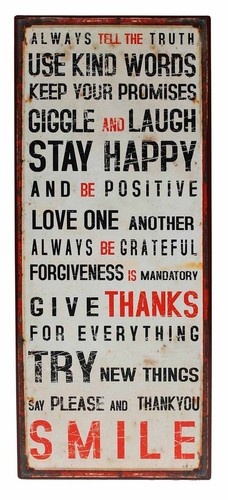I recently joined Pinterest. I resisted for a little while, like I always do, but eventually decided that it would be a convenient way to store ideas for home decorating (I just moved house) and wedding planning (for next fall). The result was my sudden immersion into Pinterest “culture.” You see, there are a lot of evangelical-fundamentalist Christians on Pinterest. It’s yet another venue where they share child-rearing advice and inspirational messages made into art projects for the home. Fundamentalist mothers are often very crafty; it’s part of a whole constellation of lifestyle choices that marry frugality and efficiency to beauty and creativity.
So, inevitably, I recognize a lot of it.

Plaques or photo frames that say “Smile,” “love,” “joy,” and especially the ones that play on the idea of house rules (“in this house we love one another”) mean something totally different to me than the words they contain.
Is there anything wrong with being positive? With remembering to use kind words and keep your promises? Is there anything wrong with staying happy and being grateful? No, of course not.
It’s the imperative that’s the problem.
My fellow bloggers have commented on emotional control extensively. As fundamentalist Christians, we were raised to be constantly on the hunt for the fruits of the Spirit (love, joy, peace, etc.). Not manifesting those traits visibly did not just mean you were having a bad day or weren’t feeling well or were having a spell of depression. It meant there was something deeply wrong with you in a spiritual sense. If you really had the Holy Spirit, you would never be anxious; you’d have peace that passes understanding. You would never be lonely or sad or fearful; you would have joy unspeakable and full of glory. You would always have a “sound mind.”
I was an extremely depressed teenager. This was not okay.
I often found myself walking blindly into chastisement because of the look on my face. What was the look? I have no idea. I was usually too surprised by the sudden reprimand to remember what I had been thinking about.
People assumed I was angry, or sulking, or thinking rebellious thoughts when I was totally minding my own business. If I wasn’t happy, they took it personally: was I resenting the authorities in my life? Feeling sorry for myself? (My pastor loved to pick on “pity parties.”) Was I letting the devil put thoughts of discontent in my head? Was I forgetting the great privilege I had to know the Truth at such a young age? Probably all of the above, right?
“You have a bad attitude” was the expression I most dreaded. How did they know what my attitude was? I hadn’t even spoken to them! But the mere absence of a smile and a slight sluggishness of movement was enough to condemn me to the heap of prayer requests for poor, struggling teens who obviously weren’t yet “sealed” with the Holy Ghost.
It’s really difficult to sort out your own actual spiritual condition when everyone around you decides what it is based on your face. I remember a lot of interventions and reproachful remarks over my “problem” and how I ought to pray harder to chase away the demons and leave my soul light and wide open for the Holy Spirit.
All I really wanted was an hour by myself to think.
So when I see plaques like the one above on Pinterest, what comes to mind is the chastisement. The imperative. “Change your attitude.” “Smile.” “Be grateful.” Don’t you dare be upset, hurt, angry, impatient, anxious or – god forbid – depressed.
What I see isn’t a gentle encouragement to count my blessings, to remember the things that make me happy. What I see is emotional control. Be happy or else. Be grateful or else. And that “else” was never ambiguous. I must live in a perpetual state of joy and peace or I’m probably missing the Rapture. Smile. Or get burned up with all the drug-dealing Muslim Democrat lawyers who kill white Christian babies while watching Satanic porn. Right?
I’m decorating my house without any “inspirational” words. Instead, I choose pictures that remind me of things I love. Forests. Maps. Animals. Words are too easily turned from expressions of kindness to demands for gratitude. They too easily become coercive. When I have children, I want our home to be the place where we can be real people. Life demands we put on enough faces as it is: work, school, sports, performance, meeting new people. Home is the place where you can go to your room and be sad for a little while. It’s the place where you can tell someone how frustrated or nervous you are and have them understand. Home ought to be the place where you scrub off your latest public persona and restore your energy, your passion, your positive feelings.
Home shouldn’t be a place where you have to perform.
















